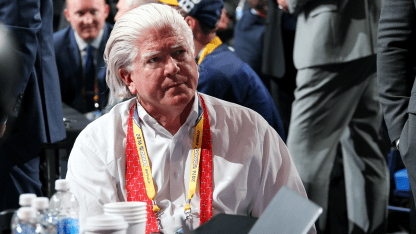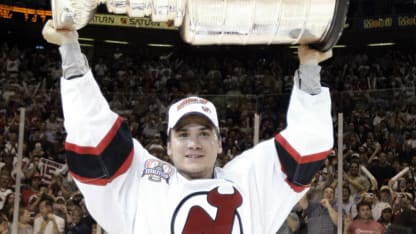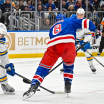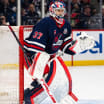If you want to know what Brian Burke is really like, Lou Lamoriello, his longtime friend, mentor and one-time coach, has the perfect way to find out.
“If you want to know about Brian or anything else, just ask Brian,” the New York Islanders general manager said with a chuckle about the always candid, often outspoken Burke. “He’ll tell you whatever you want.
“I do know this: He just keeps going and going and going …”
In this instance, he is going right into the U.S. Hockey Hall of Fame as part of the Class of 2023.
And rightly so.
When the 68-year-old is officially inducted at the Westin Copley Place Hotel in Boston on Wednesday, he’ll join an elite group that has helped bring the sport into the mainstream in the U.S., at the grassroots and professional levels. Not bad for a local kid who was born and bred 50 miles to the south in Providence, Rhode Island.
“It is such an honor,” Burke said. “This sport, this game, it’s been my life. It’s very humbling.”
Humbling is not a word typically associated with Burke, who’s known for his fearless, get-to-the-point takes about the sport, no matter who might disagree. He’s always worn his heart on his sleeve and never been shy to make his opinion known about a subject.
That’s why his openness and emotions about the sport in his native country, and his place in it, is reflective of how deep the impact of his addition to the Hall really is.
“Think about it,” he said. “Mine is the story of an underdog. A real underdog.
“How many people do you know could have this type of impact, this type of journey, when they only started playing hockey at the age of 13?”
Indeed, his is a story that is uniquely Brian Burke.
At age 12, his family moved to Edina, Minnesota, where he discovered the joy of hockey. One year later, he began playing, often on an outdoor rink.
It was the start of a long road that would see him do pretty much everything in the game.
From 1973-77, he played for the Providence College Friars under Lamoriello, where he was teammates with future NHL player Ron Wilson and served as captain during his senior year. In 1977-78 he played for Maine of the American Hockey League and helped the team win the Calder Cup.
“I remember one of my former teammates at Providence, Bob O’Connor, he coached a midget team in Minnesota and told me to come to Detroit to watch a tournament,” Lamoriello said. “He told me to keep my eyes on a specific kid. Brian Burke.”
He did.
“Afterward, after watching, I went up to Bobby and said: ‘The kid will never play.’”
Not so fast.
“A year or two later, I watched him play high school with Edina and he was a different player,” Lamoriello said. “It was his work ethic. He worked and worked and worked.”
It would be the mantra of Burke’s hockey life.
Lamoriello eventually met with Burke’s family.
“I couldn’t offer him a scholarship because I didn’t think he was at that point yet,” Lamoriello said.
No matter. Burke was on a mission.
“I walked on as a freshman, I didn’t get any money as a freshman,” he said. “I started killing penalties. Four years later I was captain and set the record there for games played.”
After his championship season with Maine, Lamoriello gave him some advice.
“I told him he’d peaked as a player and wouldn’t go any further,” he said. “I told him to go to school. He did, and the rest is history.”
Burke heeded Lamoriello’s advice and went to Harvard Law School, where he graduated in 1981. He went on to become a player agent, finding a way to stay in the game he loved.
In 1987 he was hired by Hockey Hall of Famer Pat Quinn to be the director of hockey operations for the Vancouver Canucks. In 1992-93 he served as general manager of the Hartford Whalers before leaving after one season to become the chief disciplinarian of the NHL, where he oversaw the handing out of fines and suspensions.
From 1998-2004 he was the GM of the Canucks and pulled off a series of trades that made for one of the most memorable NHL drafts in history. After Burke was done wheeling and dealing at the 1999 NHL Draft, the Canucks had the No. 2 and No. 3 picks, which they used to take Swedish twins Daniel and Henrik Sedin, who would each produce a Hall of Fame career in Vancouver.
Burke became GM of the Anaheim Mighty Ducks in 2005 and helped the team win a Stanley Cup in 2007. From 2008-13 he served the same role with the Toronto Maple Leafs. Stints as director of hockey operations with the Calgary Flames (2013-18) and Pittsburgh Penguins (2021-23) followed.
In between jobs with teams, Burke has been an analyst for Rogers and Sportsnet, espousing his strong opinions.
He has also been a vocal proponent of LGBTQ+ rights, establishing the You Can Play project that targets homophobia and promotes safety and inclusion in sports, in honor of his late son, Brendan.
On Aug. 29, 2023, Burke was named the Executive Director of the Professional Women’s Hockey League Players' Association, the player union for the newly formed Professional Women's Hockey League (PWHL).
On the international front, Burke has been actively involved with USA Hockey and was GM for his country’s silver medal team at the 2010 Winter Olympics in Vancouver, when Sidney Crosby’s golden goal in overtime gave Canada a heartbreaking win over Team USA in the final.
Through it all, he has left a footprint in the development of USA Hockey for more than four decades.
“Like any other USA Hockey sort of person in the earlier days, you know, it really was always a Canadian game, without question,” Lamoriello said. “And so, I think that anybody who had any success or had some type of influence on the perception of American hockey as the game developed here is significant.
“In Brian’s case, there’s no question he’s done that. And he’s pretty much done everything a person could do in the game. He’s very deserving of this honor.”
Ask Burke about the highlight of his illustrious career, and the Stanley Cup championship in Anaheim stands out.
“You're walking around on the ice with the Stanley Cup and it's a real pinch-me moment,” he said. “I put in the time and had worked my butt off, but a lot of guys had done that and never got to hold up the Stanley Cup. I was so fortunate. I still feel that way. We had a great team. No one can ever take that away from us.
“The Vancouver Olympics rank up there too. We were picked to finish sixth before the tournament. We were ridiculed. And we ended up taking the host country, with one of the biggest home ice advantages you’ll ever find, to overtime of the gold medal game. That’s something to be proud of.”
So, too, is the growth of USA Hockey, he said.
“The ‘Miracle on Ice’ team that won the gold at the 1980 Lake Placid Olympics, that had to be the No. 1 most influential moment for the sport in our country,” Burke said. “There’s been others. Winning the 1996 World Cup. The silver medal in Vancouver. Gold medalists at the first women's Olympic tournament in 1998 in Nagano, Japan. The establishment of the PWHL in 2023.
“The development of USA Hockey has been impressive. And I’m very proud just to have been a small part of it.”



















